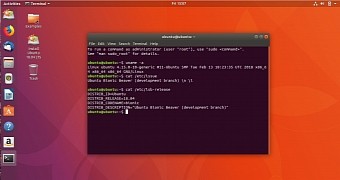As of today, the current daily builds of the upcoming Ubuntu 18.04 LTS (Bionic Beaver) operating system are powered by the latest stable Linux 4.15 kernel series.
The Ubuntu Kernel team promised at the beginning of the development cycle for Ubuntu 18.04 LTS (Bionic Beaver), Canonical's seventh long-term supported Ubuntu release to receive security and software update for the next five years, that they target the Linux 4.15 kernel series for the operating system.
Linux 4.15 had one of the longest development cycles in the history of kernels for GNU/Linux distributions, due to the numerous patches to mitigate the nasty Meltdown and Spectre security vulnerabilities for 64-bit architectures. It finally arrived at the end of January, so it took a month for Ubuntu Kernel team to implement it.
But now it's finally here for early adopters of Ubuntu 18.04 LTS, patching it against Spectre and Meltdown flaws, which are known to put billions of devices at risk. We took today's daily build ISO image for a test drive, and it looks like it's fuelled by Linux kernel 4.15, which is also available in the repos for existing users to update.
Ubuntu 18.04 LTS arrives April 26, 2018, powered by Linux kernel 4.15
Ubuntu 18.04 LTS (Bionic Beaver) is slated for release this spring on April 26, 2018, and Canonical said that it would ship with Linux kernel 4.15 by default. The latest stable kernel at the moment of writing is Linux 4.15.5, released on February 22, 2018, which is already available in Ubuntu 18.04 LTS' software repositories.
Besides being the first kernel release to come built-in with patches for the Meltdown and Spectre security vulnerabilities, it also adds support for AMD Secure Encrypted Virtualization functionality on AMD CPUs, support for the User-Mode Instruction Prevention feature on Intel CPUs, as well as support for the RISC-V architecture.
Other interesting features include modesetting support for the AMDGPU open-source graphics driver for AMD Radeon GPUs, better power usage for systems with the SATA Link Power Management feature, a new cgroupv2-enabled CPU controller that improves CPU usage restrictions, and numerous updated drivers.

 14 DAY TRIAL //
14 DAY TRIAL //